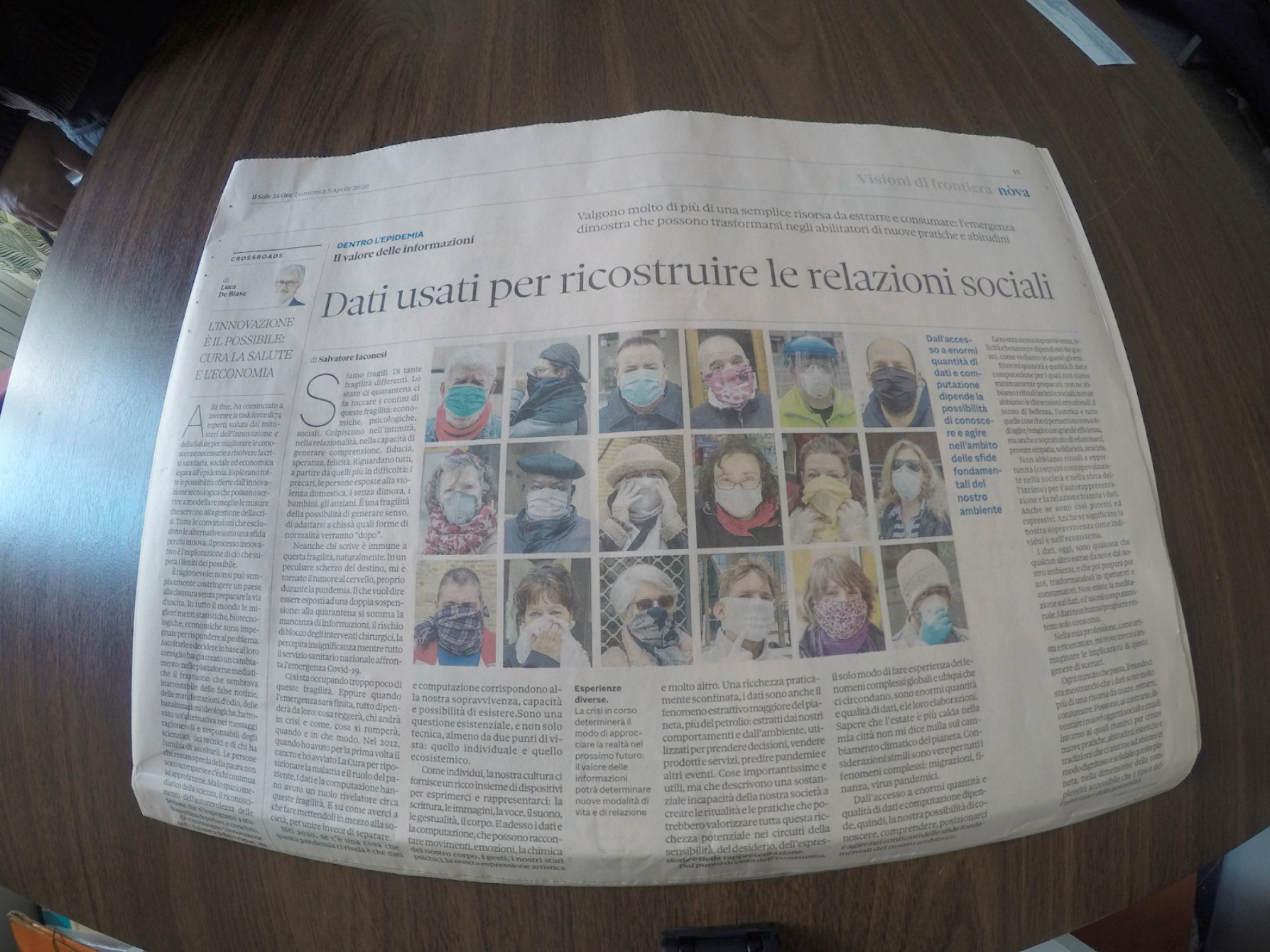A dispatch from Salvatore Iaconesi, artist and technologist based in Rome
[This dispatch, originally published in Italian on the newspaper Il Sole 24 Ore, is part of a series. Read the previous ones here.]

We are fragile. Of so many different frailties. The state of quarantine makes us touch the borders of these fragility: economic, psychological, social. They have impacts on our intimacy, relationships, in the ability to generate understandings about the world, on trust, hope, happiness. They concern everyone, starting with the weakest: the precarious workers, people exposed to domestic violence, the homeless, children, the elderly. It is a fragility of the possibility of generating meaning, of adapting to who knows what forms of normality will come “after”.
Not even who is writing is immune to this fragility, of course. In a peculiar twist of fate, during the pandemic, my brain cancer relapsed. This means being exposed to a double state of suspension: the lack of information, the risk of blockage of surgical interventions, the perceived insignificance while the entire national health service faces the emergency COVID-19 add to the quarantine.
Too little attention is being paid to these frailties. Yet when the emergency is over, everything will depend on them: what will hold; who will go into crisis and how; what will break, when and how.
In 2012, when I first had cancer and started La Cura to reposition in society the disease and the role of the patient (www.la-cura.it), data and computation played a revealing role about these frailties. And on how to deal with putting them in the midst of society, to unite instead of separating.
In 2020, if there is one thing that this pandemic reveals to us, it is that data and computation correspond to our survival, ability and to the possibility to exist.
They are an existential issue, and not just a technical one, at least from two points of view: the individual one and the ecosystemic one.
As individuals, our culture provides us with a rich set of devices to express and represent us: writing, images, voice, sound, gestures, the body. And now data and the computation, which can tell about movements, emotions, the chemistry of our body, gestures, our psychic states, our artistic expression and much more. A practically boundless wealth, data are also the largest extractive phenomenon on the planet, more than oil: extracted from our behavior and the environment, used to make decisions, sell products and services, predict pandemics and other events. Very important and useful things, but which describe a substantial inability of our society to create the rituals and practices that could enhance all this potential wealth in the circuits of sensitivity, desire, expression and representation.
From the point of view of the ecosystem, the only way to experience the global and ubiquitous complex phenomena that surround us are huge quantities and qualities of data, and their processing. Knowing that summer is warmer in my city tells me nothing about the planet’s climate change. Similar considerations are true for all complex phenomena: migration, finance, pandemic viruses.
In our hyperconnected society, our ability to know, understand, position ourselves and act towards the fundamental challenges of our environment depends on the access to huge quantities and quality of data and computation.
Our very survival, happiness and well-being depend on it, as we see in these days.
Huge quantities and quality of data and computation for which we are not in the least prepared: we do not have the intimate and social rituals to deal with them; we do not have the emotional dimensions, the sense of beauty, aesthetics and all those things that allow us not only to act / react with great efficiency, but also and above all to relate, to feel empathy, solidarity, friendship.
We have no rituals and opportunities (consciously built in society and in the intimate sphere) for self-representation and the relationship through data. Even if they are so powerful and expressive. Even if they mean our survival as individuals and in the ecosystem.
Data today is something that someone else extracts from us and our environment, and then prepares for us, transforming us into spectators and consumers.
There is no data-meditation, or computational asceticism. Data has no prayers and totems: only consumption.
In my profession, as an artist and researcher, I find myself instead imagining the implications of these kinds of scenarios.
With every passing minute, the world is showing us that data is much more than a resource to be used, extracted, consumed. On the contrary, data can become the new social and ritual objects around which to gather to create new practices, habits, aesthetics and traditions that help us to inhabit this planet: with dignity, solidarity and in the dimension of accessible complexity that is typical of friendship and generosity.

